-
 Bitcoin
Bitcoin $87,502.5887
2.57% -
 Ethereum
Ethereum $1,575.8607
-1.03% -
 Tether USDt
Tether USDt $1.0000
0.01% -
 XRP
XRP $2.0821
-0.02% -
 BNB
BNB $596.8461
0.62% -
 Solana
Solana $136.4451
-1.89% -
 USDC
USDC $0.9998
0.00% -
 Dogecoin
Dogecoin $0.1591
2.23% -
 TRON
TRON $0.2466
1.15% -
 Cardano
Cardano $0.6225
-0.04% -
 Chainlink
Chainlink $13.0847
-1.69% -
 UNUS SED LEO
UNUS SED LEO $9.0718
-2.75% -
 Avalanche
Avalanche $19.7229
0.44% -
 Stellar
Stellar $0.2488
1.71% -
 Shiba Inu
Shiba Inu $0.0...01232
-0.37% -
 Toncoin
Toncoin $2.8836
-3.97% -
 Hedera
Hedera $0.1692
1.27% -
 Sui
Sui $2.1912
3.31% -
 Bitcoin Cash
Bitcoin Cash $343.7049
2.00% -
 Hyperliquid
Hyperliquid $18.1311
2.64% -
 Polkadot
Polkadot $3.7696
-2.88% -
 Litecoin
Litecoin $78.0049
0.01% -
 Dai
Dai $0.9998
-0.01% -
 Bitget Token
Bitget Token $4.4398
0.12% -
 Ethena USDe
Ethena USDe $0.9992
0.00% -
 Pi
Pi $0.6313
-1.51% -
 Monero
Monero $215.8608
0.65% -
 Uniswap
Uniswap $5.2562
-0.37% -
 Pepe
Pepe $0.0...07708
1.96% -
 OKB
OKB $51.0125
1.32%
How do Bitcoin payment platforms comply with Anti-Money Laundering (AML) regulations?
Bitcoin payment platforms ensure AML compliance through CDD, transaction monitoring, and reporting suspicious activities, using blockchain analytics and collaborating with regulators.
Apr 20, 2025 at 07:15 am

Bitcoin payment platforms operate at the intersection of cryptocurrency and traditional finance, necessitating strict adherence to Anti-Money Laundering (AML) regulations. Compliance with these regulations is crucial to prevent the misuse of digital currencies for illicit activities such as money laundering and terrorist financing. This article explores the various ways Bitcoin payment platforms ensure they meet AML requirements.
Understanding AML Regulations
AML regulations are designed to prevent the use of financial systems for illegal activities. These regulations vary by jurisdiction but generally include requirements for customer due diligence (CDD), transaction monitoring, and reporting of suspicious activities. For Bitcoin payment platforms, compliance with these regulations is essential to operate legally and maintain trust with users and regulators.
Customer Due Diligence (CDD)
One of the primary ways Bitcoin payment platforms comply with AML regulations is through Customer Due Diligence (CDD). CDD involves verifying the identity of users before allowing them to use the platform. This process typically includes:
- Collecting personal information such as name, address, and date of birth.
- Verifying identity through documents like passports or driver's licenses.
- Screening against watchlists to ensure users are not on any government or international sanctions lists.
By implementing robust CDD measures, Bitcoin payment platforms can better understand their users and mitigate the risk of facilitating illegal activities.
Transaction Monitoring
Transaction monitoring is another critical component of AML compliance for Bitcoin payment platforms. This involves continuously tracking and analyzing transactions to detect and report any suspicious activity. Key aspects of transaction monitoring include:
- Real-time analysis of transaction patterns to identify unusual behavior.
- Setting thresholds for transaction amounts that trigger further investigation.
- Using advanced analytics and machine learning algorithms to detect potential money laundering schemes.
By monitoring transactions effectively, Bitcoin payment platforms can quickly identify and report suspicious activities to the relevant authorities, thus complying with AML regulations.
Reporting Suspicious Activities
In addition to monitoring transactions, Bitcoin payment platforms are required to report suspicious activities to the appropriate financial intelligence units (FIUs). This includes:
- Filing Suspicious Activity Reports (SARs) when transactions appear to be linked to money laundering or other illegal activities.
- Maintaining records of all transactions and reports for a specified period, usually several years, as required by law.
Prompt and accurate reporting of suspicious activities is essential for Bitcoin payment platforms to demonstrate their commitment to AML compliance.
Implementing Know Your Business (KYB)
For platforms that cater to business clients, Know Your Business (KYB) procedures are crucial for AML compliance. KYB involves:
- Verifying the identity of business owners and key personnel.
- Checking the legitimacy of the business through registration documents and financial statements.
- Ongoing monitoring of the business's activities and transactions.
By conducting thorough KYB checks, Bitcoin payment platforms can ensure that they are not inadvertently facilitating illegal activities through their business clients.
Enhanced Due Diligence (EDD)
In cases where standard CDD measures are not sufficient, Bitcoin payment platforms may need to conduct Enhanced Due Diligence (EDD). EDD is typically required for high-risk customers or transactions and includes:
- Gathering additional information about the customer's source of funds and wealth.
- Conducting more frequent and detailed reviews of the customer's transactions.
- Implementing stricter monitoring and reporting requirements.
EDD helps Bitcoin payment platforms address higher risks and maintain compliance with AML regulations.
Training and Compliance Programs
To ensure that all employees understand and adhere to AML regulations, Bitcoin payment platforms must implement comprehensive training and compliance programs. These programs typically include:
- Regular training sessions on AML policies and procedures.
- Creating a culture of compliance within the organization.
- Establishing clear policies and procedures for reporting and handling suspicious activities.
By investing in training and compliance programs, Bitcoin payment platforms can ensure that their staff is well-equipped to meet AML requirements.
Use of Blockchain Analytics
Blockchain analytics tools are increasingly used by Bitcoin payment platforms to enhance their AML compliance efforts. These tools help platforms:
- Trace the origin and movement of Bitcoin transactions on the blockchain.
- Identify patterns associated with money laundering or other illicit activities.
- Enhance the effectiveness of transaction monitoring and reporting.
By leveraging blockchain analytics, Bitcoin payment platforms can improve their ability to detect and prevent money laundering, thus strengthening their AML compliance.
Collaboration with Regulators and Industry Partners
Finally, Bitcoin payment platforms often collaborate with regulators and industry partners to improve their AML compliance. This collaboration can take various forms, including:
- Participating in industry forums and working groups focused on AML issues.
- Engaging with regulatory bodies to understand and implement the latest AML requirements.
- Sharing best practices and insights with other platforms to enhance overall industry compliance.
Through active collaboration, Bitcoin payment platforms can stay ahead of evolving AML regulations and maintain high standards of compliance.
Frequently Asked Questions
Q: How do Bitcoin payment platforms handle privacy concerns while complying with AML regulations?
A: Bitcoin payment platforms balance privacy and AML compliance by collecting only necessary information for verification and using encryption to protect user data. They also implement strict access controls to ensure that personal information is only accessed for legitimate purposes.
Q: Can Bitcoin payment platforms operate without AML compliance?
A: No, Bitcoin payment platforms cannot operate legally without adhering to AML regulations. Non-compliance can result in severe penalties, including fines, license revocation, and criminal charges.
Q: How do international differences in AML regulations affect Bitcoin payment platforms?
A: Bitcoin payment platforms must navigate a complex landscape of international AML regulations. They often implement the strictest standards across all jurisdictions they operate in to ensure compliance everywhere. This may involve adapting their CDD, transaction monitoring, and reporting processes to meet the requirements of different countries.
Q: What role do third-party services play in helping Bitcoin payment platforms with AML compliance?
A: Third-party services, such as identity verification providers and blockchain analytics firms, play a crucial role in helping Bitcoin payment platforms comply with AML regulations. These services offer specialized tools and expertise that enhance the platforms' ability to conduct CDD, monitor transactions, and report suspicious activities effectively.
Disclaimer:info@kdj.com
The information provided is not trading advice. kdj.com does not assume any responsibility for any investments made based on the information provided in this article. Cryptocurrencies are highly volatile and it is highly recommended that you invest with caution after thorough research!
If you believe that the content used on this website infringes your copyright, please contact us immediately (info@kdj.com) and we will delete it promptly.
- Coinbase Exchange Has Launched CFTC-regulated Futures Tied to the Ripple-linked XRP Token
- 2025-04-22 07:40:12
- Injective Protocol to Host Demo Day Showcasing Top Teams and Projects
- 2025-04-22 07:40:12
- TRON (TRX) is currently trading at $0.2426
- 2025-04-22 07:35:13
- Coinbase vet Daniel Harrison joins Phantom as comms head
- 2025-04-22 07:35:13
- Crypto Market Witnesses Optimism in the Altcoin Sector As Shown by the TOTAL3 Index (MC Excluding BTC and ETH)
- 2025-04-22 07:30:12
- SUI may be regaining some strength, recording a gradual hike of 4.23% in the last 24 hours
- 2025-04-22 07:30:12
Related knowledge
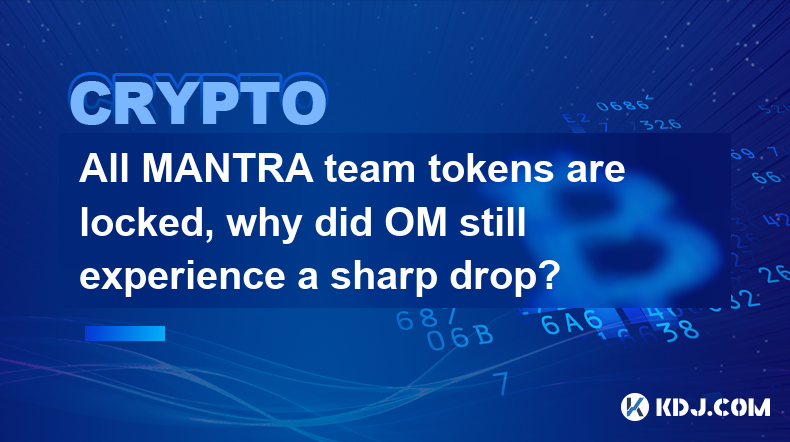
All MANTRA team tokens are locked, why did OM still experience a sharp drop?
Apr 20,2025 at 11:14am
Introduction to MANTRA and OM TokenThe MANTRA project is a blockchain platform that aims to provide a scalable and secure environment for decentralized applications (dApps). The native token of the MANTRA ecosystem is OM, which plays a crucial role in governance, staking, and other functionalities within the platform. Recently, the MANTRA team announced...
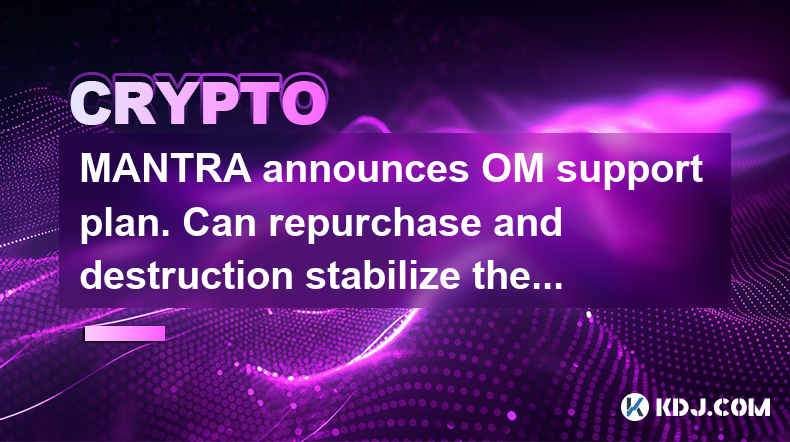
MANTRA announces OM support plan. Can repurchase and destruction stabilize the currency price?
Apr 21,2025 at 01:57pm
MANTRA, a notable player in the cryptocurrency ecosystem, has recently announced an OM support plan that includes mechanisms for repurchasing and destroying tokens. This move has sparked significant interest and discussion within the crypto community, particularly around its potential impact on the stability of the OM token's price. In this article, we ...
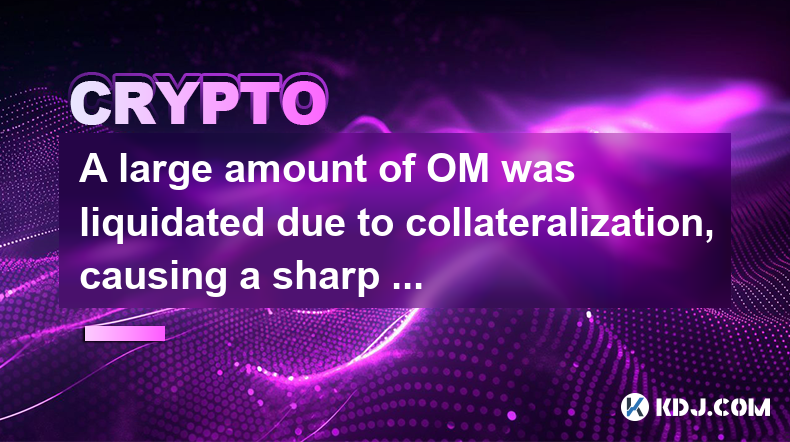
A large amount of OM was liquidated due to collateralization, causing a sharp drop? MANTRA analyzes the reasons for the market turmoil
Apr 21,2025 at 01:57am
The cryptocurrency market is known for its volatility, and sharp price movements can often be attributed to a variety of factors. Recently, a large amount of OM (Mantra DAO's native token) was liquidated due to collateralization issues, leading to significant market turmoil. In this article, MANTRA analyzes the reasons behind this event and the subseque...
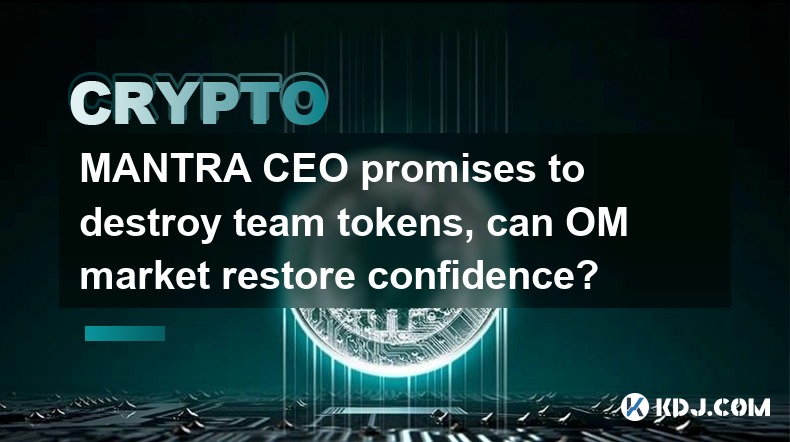
MANTRA CEO promises to destroy team tokens, can OM market restore confidence?
Apr 21,2025 at 08:28am
The recent announcement from the CEO of MANTRA about destroying team tokens has sparked a wave of discussions within the cryptocurrency community. This move is seen as a strategic effort to restore confidence in the OM market, which has been facing various challenges. The decision to burn team tokens is not just a simple action; it involves a series of ...
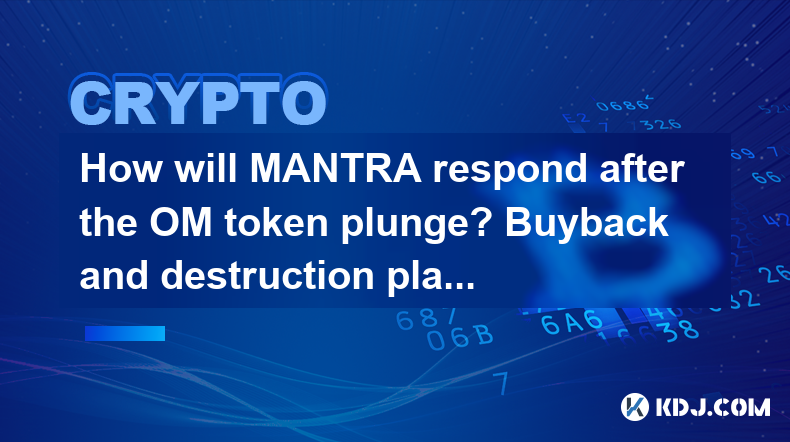
How will MANTRA respond after the OM token plunge? Buyback and destruction plan revealed
Apr 19,2025 at 11:42pm
The recent plunge in the OM token price has left many investors and enthusiasts of the MANTRA ecosystem concerned about the future stability and value of their holdings. In response to these market fluctuations, MANTRA has announced a comprehensive buyback and destruction plan aimed at restoring confidence and supporting the long-term health of the OM t...
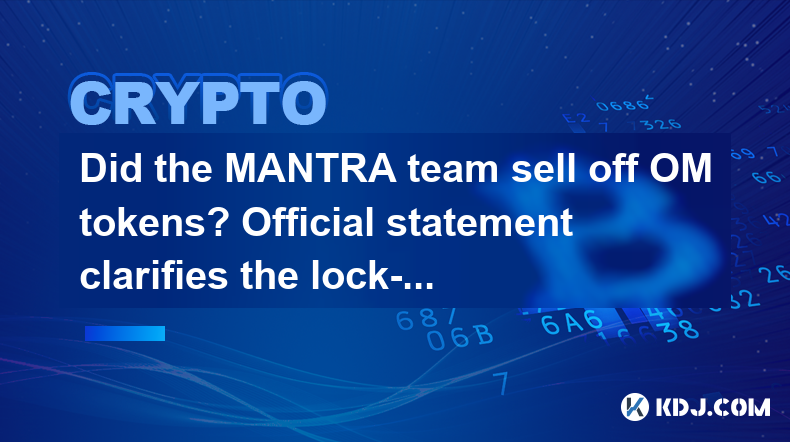
Did the MANTRA team sell off OM tokens? Official statement clarifies the lock-up situation
Apr 19,2025 at 10:56pm
The recent buzz around the MANTRA project and its native token, OM, has led to speculation and concerns within the cryptocurrency community about whether the MANTRA team has sold off their OM tokens. To address these concerns and clarify the situation, the MANTRA team has released an official statement detailing the lock-up situation of their tokens. Th...

All MANTRA team tokens are locked, why did OM still experience a sharp drop?
Apr 20,2025 at 11:14am
Introduction to MANTRA and OM TokenThe MANTRA project is a blockchain platform that aims to provide a scalable and secure environment for decentralized applications (dApps). The native token of the MANTRA ecosystem is OM, which plays a crucial role in governance, staking, and other functionalities within the platform. Recently, the MANTRA team announced...

MANTRA announces OM support plan. Can repurchase and destruction stabilize the currency price?
Apr 21,2025 at 01:57pm
MANTRA, a notable player in the cryptocurrency ecosystem, has recently announced an OM support plan that includes mechanisms for repurchasing and destroying tokens. This move has sparked significant interest and discussion within the crypto community, particularly around its potential impact on the stability of the OM token's price. In this article, we ...

A large amount of OM was liquidated due to collateralization, causing a sharp drop? MANTRA analyzes the reasons for the market turmoil
Apr 21,2025 at 01:57am
The cryptocurrency market is known for its volatility, and sharp price movements can often be attributed to a variety of factors. Recently, a large amount of OM (Mantra DAO's native token) was liquidated due to collateralization issues, leading to significant market turmoil. In this article, MANTRA analyzes the reasons behind this event and the subseque...

MANTRA CEO promises to destroy team tokens, can OM market restore confidence?
Apr 21,2025 at 08:28am
The recent announcement from the CEO of MANTRA about destroying team tokens has sparked a wave of discussions within the cryptocurrency community. This move is seen as a strategic effort to restore confidence in the OM market, which has been facing various challenges. The decision to burn team tokens is not just a simple action; it involves a series of ...

How will MANTRA respond after the OM token plunge? Buyback and destruction plan revealed
Apr 19,2025 at 11:42pm
The recent plunge in the OM token price has left many investors and enthusiasts of the MANTRA ecosystem concerned about the future stability and value of their holdings. In response to these market fluctuations, MANTRA has announced a comprehensive buyback and destruction plan aimed at restoring confidence and supporting the long-term health of the OM t...

Did the MANTRA team sell off OM tokens? Official statement clarifies the lock-up situation
Apr 19,2025 at 10:56pm
The recent buzz around the MANTRA project and its native token, OM, has led to speculation and concerns within the cryptocurrency community about whether the MANTRA team has sold off their OM tokens. To address these concerns and clarify the situation, the MANTRA team has released an official statement detailing the lock-up situation of their tokens. Th...
See all articles






















































































